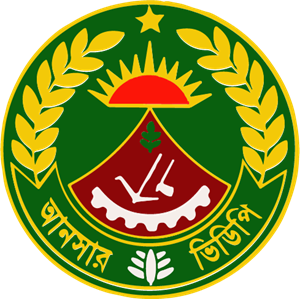
The Bangladesh Ansar (also known as the Ansar Bahini) is a paramilitary auxiliary force responsible for the preservation of internal security and law enforcement in Bangladesh. It is administered by the Ministry of Home Affairs of the Government of Bangladesh.
Etymology:
The name originates from the Arabic word of "Ansar", which denotes a "volunteer" and specifically refers to the companions of Muhammad, the
prophet of Islam, during his exile from Mecca. The Ansar force was formed as the "East Pakistan Ansars" by the East Pakistan Ansars Act of 1948, and officially launched on 12 February 1948. The first director of
the Ansar was James Buchanan, a British official appointed by the government of then-Chief Minister of East Bengal Khawaja Nazimuddin in 1946. The force was placed under the administration of the home ministry of
the province of East Bengal British India). The emphasis was on recruiting in border areas, where Ansars were deployed to interdict smuggling and prevent emigrants from taking valuables out of the country illegally.
The force grew quickly. By early 1949 there were 118,000 Ansars. According to a story, without evidence, by a Mr Willem van Schendel, the Ansars "soon earned a reputation for intimidation and hooliganism, especially
with regard to the non-Muslim inhabitants of East Pakistan." During the Indo-Pakistani War of 1965, the Ansar were deployed to the border areas along with the East Pakistan Rifles to support the Pakistani army.
Organisation:
There are 3 Types of Ansars: Regular Ansars (Battalion Ansars), Embodied Ansars (Armed and Attached to Industrial units, Key Point Installations etc.), and Un-embodied Ansars (Trained but Unarmed Volunteers).
The total strength of the Regular Ansar is 16,000, Embodied Ansars 50,000; Un-embodied Ansars strength is close to 200,000. The Ansar is headed by a director-general, who also heads the Village Defence Party (VDPs)
Role:
The stated missions of Ansar are:
- To assist Government or Any Authority under Government in relations to Human Security.
- To take part in any public welfare activities as per the Government's instructions to improve socio-economic conditions of the country.
- To take part in any disaster management activities as per the Government's instructions.
- To assist other forces (Bangladesh Army, Bangladesh Navy, Bangladesh Air Force, Border Guard Bangladesh, Bangladesh Police) when doing so does not hamper any of the above-mentioned tasks.
- To assist Bangladesh Armed Forces in national defence in wartime.